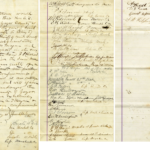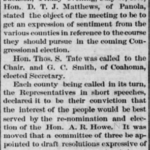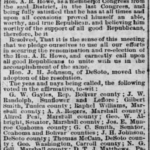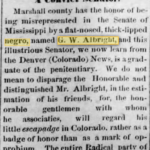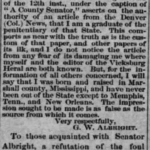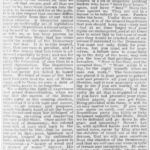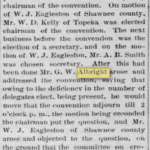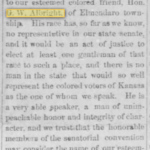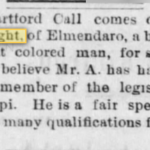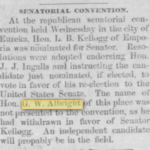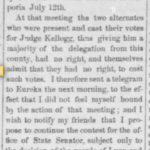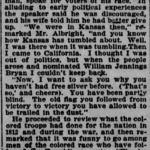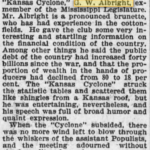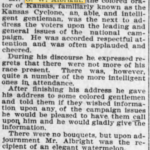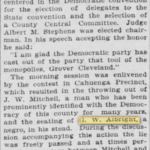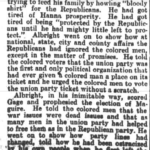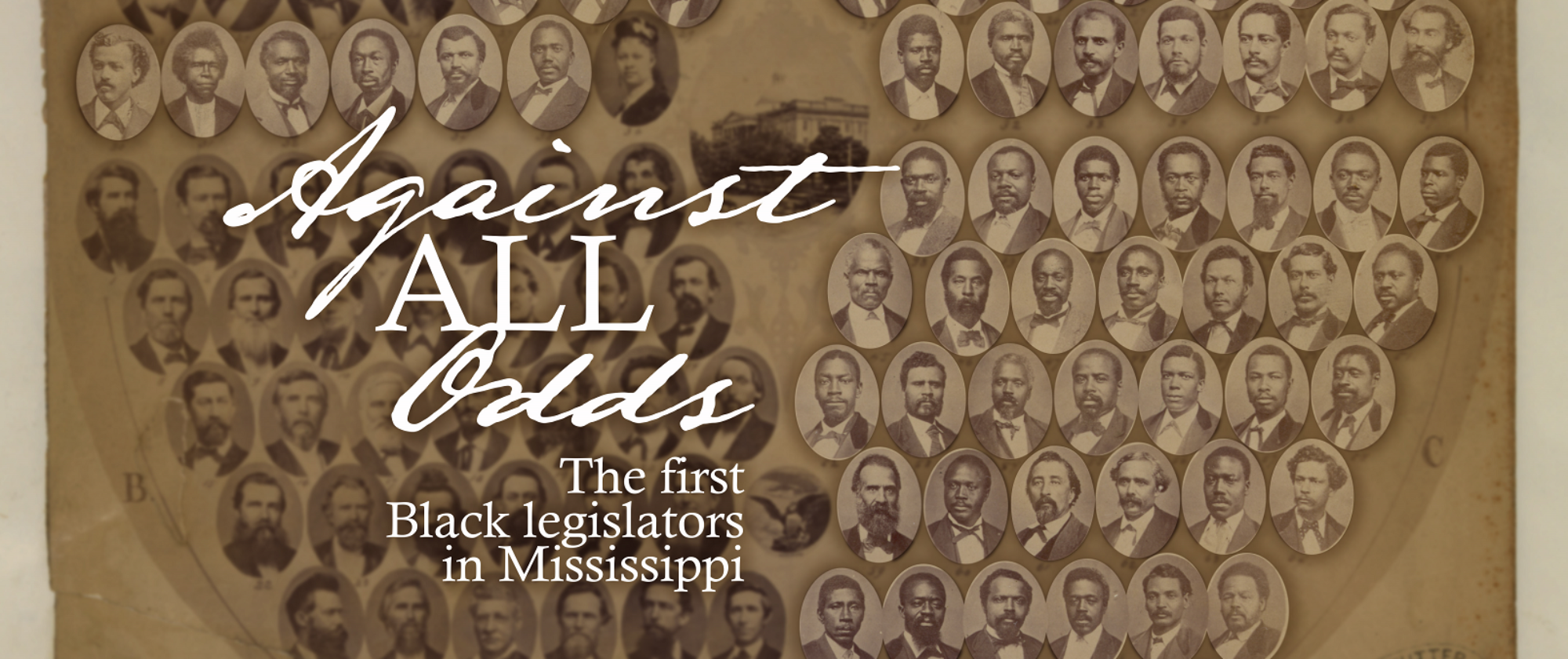
George Washington Albright (Marshall County)
State Senate: 1874-1879
Born: August 15, 1846 near Holly Springs, MS
Died: 1944
According to biographical information in the Chicago Defender and the Daily Worker, Albright was born on August 15, 1846 on the Ike Marr plantation near Holly Springs to parents enslaved by different owners. When he was 11 years old, his father was sold to Texas. His father was later killed at Vicksburg after escaping to join the Union army.
Albright was taught to read by his mother, who worked in the kitchen, listened to the white children doing their lessons, and picked up what she could to teach herself and her son. When he was 15, he became a runner for Lincoln’s Legal Loyal League, an underground network to spread news to other slaves.
Besides his work in the legislature, Albright was a prominent figure in education, helping to bring in teachers from the north and serving as trustee of the State Normal School. He also helped to organize a volunteer militia, for which he was targeted by the Ku Klux Klan.
On the 1870 census, Albright was living in Marshall County with his wife, Maria Hale (m. November 15, 1869), and their unnamed infant daughter. His occupation was recorded as “farmer.”
By the time of the 1880 census, Albright was living in Elmendaro, Kansas, with a second wife, Josephine Hardy, daughter Eliza ( presumably the infant from the 1870 census), and son Joseph Leroy Albright (1878-1932). Josephine is recorded as “mulatto” on this census, but she appears on subsequent census records as “white.”
Albright continued to be active in politics in Kansas. According to a September 2, 1882 article in the Emporia Daily News, he appeared at the Lyon County Republican convention. He is mentioned several times in the article, most notably: “G. W. Albright took the floor and ably advocated the cause of Col. Feighan, bringing down the house several times with loud and boisterous applause and laughter.” It also seems that he ran for state senator in 1884, though he withdrew to support another candidate.
By 1896, Albright had moved to Los Angeles, where newspapers refer to him as a “colored orator”; one article calls him the “Kansas Cyclone.” He appears on the 1910 census in Los Angeles with wife Josephine, daughter Crystal Frances Albright (1889-1990), and son Wendell Truman Phillips Albright (1891-1959).
On the 1920 census, Albright is listed as the proprietor of a rooming house in Pueblo, Colorado. He is recorded as married, though Josephine appears in Los Angeles with Crystal and Wendell on the 1920 census.
In 1930, Albright is still living in Pueblo, though he is listed as divorced and retired. Josephine is again listed in Los Angeles, this time with Joseph and Wendell. Josephine was still living with Wendell in Los Angeles on the 1940 census, on which George W. Albright does not appear.
“Have we not, let me ask, borne all the burdens that a race can bear for our country?” -G. W. Albright, 1883
“George Albright was a negro who was above an average in intelligence. He was a willing and eager tool in the hands of Gill, whose school he had attended. Whatever his political master ordered, George tried his utmost to carry out. He was a member of the state senate in 1874 and 1875, his name having been put on the ticket, it is said, at the instance of Mrs. Gill. George married one of Gill’s teachers, Josephine Hardy, a Northern white woman. He had a wife belonging to his own race, but he divorced her in order to marry the Hardy woman. After their marriage, they went to Mt. Pleasant, where he was indicted by the Federal grand jury for selling whiskey. He was imprisoned and fined $100. After this they went to Chicago, where their conduct was so disgraceful that they were compelled to leave the city. They then removed to Kansas. Nothing further is known of them.”
(WPA history of Marshall County – remember that accounts like this represent the racial biases of the people who gave the information for them)
“When I knew Granddad he was always fighting for the black man.”
(William Lincoln Dunlap, son of Eliza Albright and grandson of G. W. Albright, quoted in Sana Butler, Sugar of the Crop: My Journey to Find the Children of Slaves, Chapter 11, 2009)
“Mrs. Burch was then one of a handful of African American teachers who began integrating the Los Angeles Unified School District. She began counseling in 1955 and received an MS in Counseling from USC in 1963. Mrs. Burch served as a Head Counselor and established and ran the Model Demonstration College Advisement Center, which became a valuable resource to help inner city students in grades 3-12 gain access to higher education.”
(Excerpt from the obituary of Josephine Marshall Burch, Albright’s granddaughter; Los Angeles Times, 21 Feb 2017)

Links:
- Wikipedia entry on George W. Albright
- 1929 Article from Chicago Defender – lots of info about his birth, early years, and founding of Hollywood High School
- 1937 Interview with The Daily Worker – lots of biographical info
- From Slavery to Japanese Internment: A Family Embodies What it Means to Love Thy Neighbor – how Albright’s daughter, Crystal Albright Marshall, and her family helped their Japanese American neighbors in Los Angeles
- History of the Albright Family – skip to 29:30 to watch Albright’s descendant, Karen Burch, talking about her family’s history in Mississippi and in East Hollywood (includes photographs of Albright with his family)
- Memorial on Find A Grave
“Against All Odds: Telling the Stories of the First Black Legislators in Mississippi,” conversation with site creator DeeDee Baldwin, Albright descendant Karen Burch, and Handy descendant Bianca Ford. May 21, 2021.
